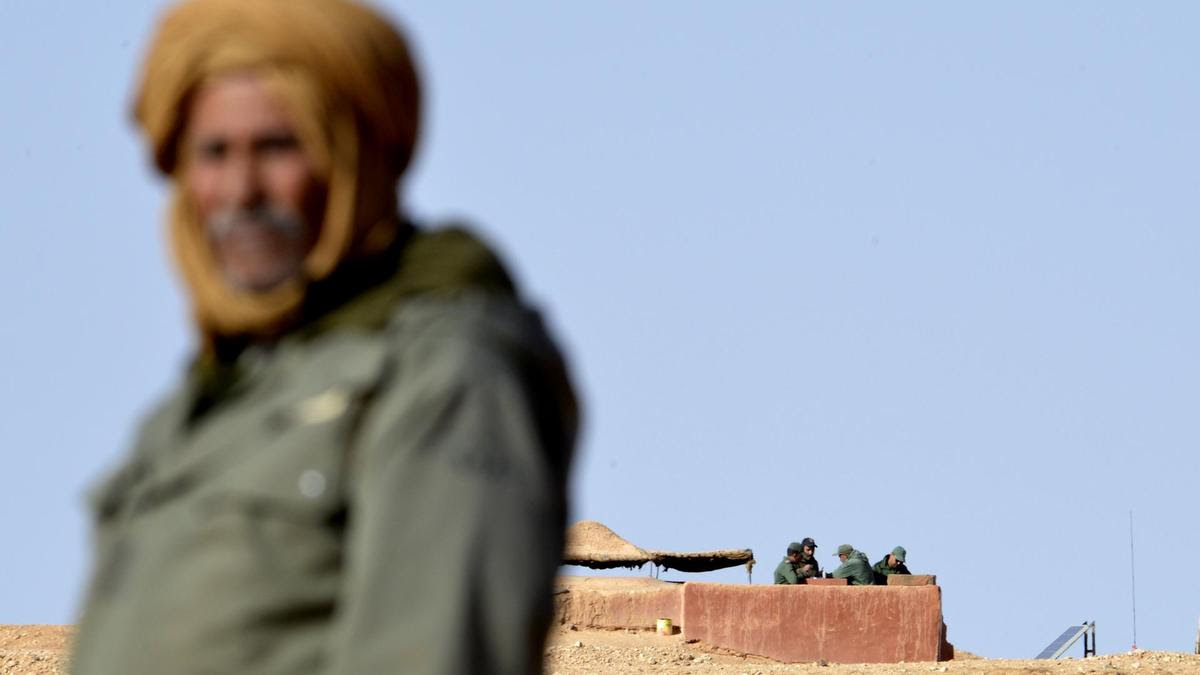The National.ae
Negotiations over disputed Maghreb region will bring together Morocco and the Polisario Front.
A file photo taken on February 3, 2017 a Sahrawi man standing in the Al-Mahbes area near Moroccan soldiers guarding the wall separating the Polisario controlled Western Sahara from Morocco. AFP
The United Nations is to host an “initial round-table”of talks in Geneva this week between Morocco and the separatist Polisario Front over the future of the Western Sahara, one of the most hotly disputed regions of the Maghreb.
The invitation letter, sent by UN envoy Horst Koehler in October, said “it is time to open a new chapter in the political process”. Though all the principal parties may be in attendance, the outcome remains uncertain.
Morocco originally claimed the former Spanish territory after the Europeans colonisers withdrew in 1975. However, the phosphate-rich region, stretching around 1,000 kilometres from Morocco’s border to the rich Atlantic coast, has since been the source of fierce local resistance and the principal staging ground for Morocco’s ongoing cold war with regional rival Algeria.
Morocco’s claims to the Western Sahara are contested by the area’s Sahrawi population, who declared the region the Sahrawi Arab Democratic Republic (SADR) the year after the Spanish pulled out. The Sahrawi’s Polisario Front, trained, equipped and armed by Algiers, has been pushing for independence ever since.
“The region is crucial to Rabat for a mix of historical, political, and economic reasons,” Sarah Feuer, a Senior Fellow at the Washington Institute told The National. “Moroccans have long considered the Sahara part of the historic region which later became their modern-day state following decolonisation from France and Spain.”
For many, the Western Sahara has become a key part of the Moroccan identity and one that would be potentially risky to cede. “Politically, when, (King) Hassan II launched the Green March in 1975 to formally take over and settle the territory, the campaign doubled the size of the kingdom and the rally-around-the-flag effect served as a compelling source of legitimacy for the Alaouite regime,” Ms Feuer continued.
However, resistance to Morocco’s territorial claims within the Western Sahara has been intense, leading to a number of short-lived conflicts between the Polisario Front and Moroccan forces during the late 1980s.
The United Nations intervened and a ceasefire was agreed in 1991. However, despite the efforts of the international community, any kind of long term settlement has proven elusive with the terms of any referendum providing the source for additional rancour.
______________
Read more:
Morocco cuts ties with Iran over Hezbollah arms transfer to Polisario Front
Iran allegations could heat up Western Sahara conflict
Opinion: Hezbollah activity in Morocco shows how far Tehran’s meddling has spread
______________
After a series of flawed peace proposals by the United Nations were rejected by all parties, Morocco forwarded its own proposal to the global body in 2006. It suggested that the Western Sahara be granted autonomy, with Rabat retaining ultimate sovereignty, including control over defence and foreign affairs, including relations with Algeria. However, subsequent talks upon the issue eventually became weighed down before being reaching a stalemate in 2012.
“From Morocco’s standpoint, Rabat has already demonstrated flexibility in offering the ‘autonomy under sovereignty’ plan of 2006,” Ms Feuer said. “I don’t anticipate them budging on this. Nor do I anticipate the Polisario showing much flexibility and dropping the demand for full independence.”
Algeria has long been party to the dispute, consistently proving as intractable in negotiations as the independence movement they arm, train and diplomatically support.
“For its part, Algiers has long used the Sahara issue as a tool to undermine its neighbour, but I suppose it’s possible that unforeseen developments surrounding the succession crisis in Algeria could alter the dynamics affecting Algiers’ longstanding support for the Polisario,” Ms Feuer continued.
Though devoid of any major infrastructure, the Western Sahara’s economic value to Morocco is notable. Morocco is the world’s largest exporter of phosphate, with a significant portion of the resource being mined within the Western Sahara. Though the legitimacy of it has been disputed, oil exploration both within the area itself, as well as offshore, promises future revenues that Rabat is likely unwilling to walk away from.
”On the economic front, this is a region rich in minerals and with a potential for oil exploration which the Moroccans are keen to exploit.” Ms Feuer said.
According to the United Nations, this latest round of talks is intended as “a first step… with the aim of reaching a just, lasting, and mutually acceptable solution which will provide for the self-determination of the people of Western Sahara”.
But among the participants at Geneva, there appears little appetite for compromise. During a recent speech, King Mohammed VI confirmed that Morocco was not prepared to yield on its “territorial integrity”, including control over Western Sahara.
Opposing the view from Rabat, key Polisario official Mhamed Khadad told AFP ahead of attending the Geneva talks that “everything can be negotiated except the inalienable and imprescriptible right of our people to self-determination”.








